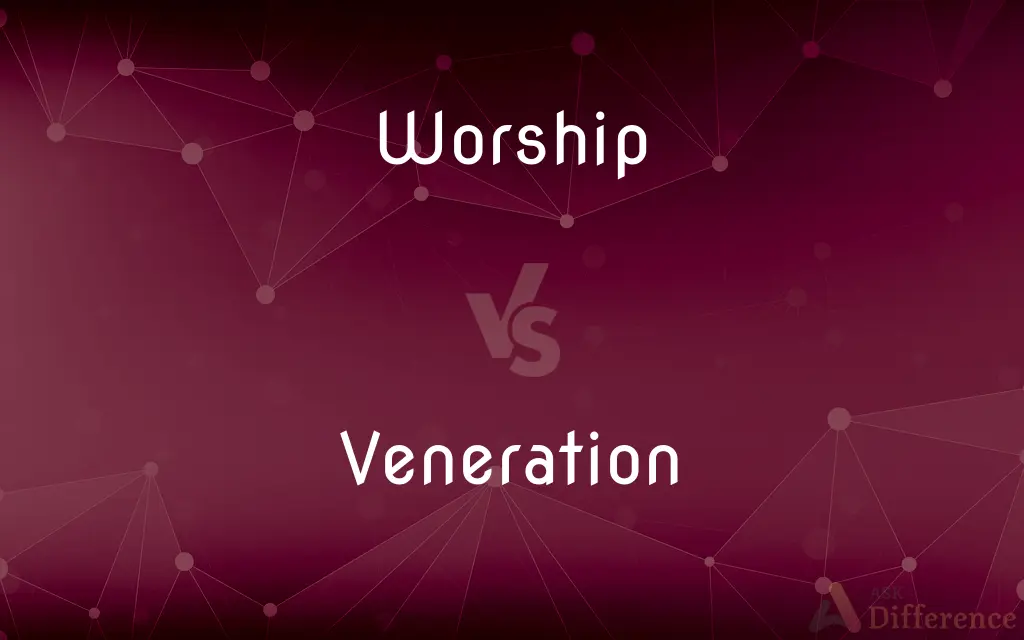Worship vs. Veneration — What's the Difference?
By Tayyaba Rehman & Fiza Rafique — Updated on September 16, 2023
"Worship" shows reverence and adoration, often directed towards a deity or divine being, and may involve rituals. "Veneration" is deep respect or awe for someone or something, usually less religiously oriented and without the ritualistic aspects.

Difference Between Worship and Veneration
Table of Contents
ADVERTISEMENT
Key Differences
"Worship" typically involves a form of devotion that is often linked to religious or spiritual practices. It's generally directed towards a deity or divine concept, and often includes rituals, prayers, or hymns. "Veneration," on the other hand, signifies a high degree of respect or awe but is less likely to involve religious rites or be directed towards a deity.
Both "Worship" and "Veneration" primarily function as nouns but can also be used as verbs. To "worship" means to perform acts of devotion, often religious, towards something or someone. To "venerate" means to regard with great respect or reverence, not necessarily in a religious context. In both cases, the terms can be turned into adjectives, as in "worshipful" and "venerable," respectively.
"Worship" generally has a more ritualistic and organized connotation and is commonly found in religious contexts. It may involve a community and usually is a part of established belief systems. "Veneration" can be more individualistic and doesn't require a set form of expression or community involvement. It can extend to venerating people for their wisdom, venerating objects like flags, or venerating concepts like freedom.
In summary, "Worship" is often an expression of devout religious or spiritual activities, whereas "Veneration" is a display of deep respect, which could be towards a wide range of entities, including non-divine figures or concepts.
Comparison Chart
Definition
Religious devotion
Deep respect
ADVERTISEMENT
Religious Context
Often
Less often
Grammatical Use
Noun & Verb
Noun & Verb
Ritualistic
Yes
No
Range of Objects
Usually divine
Can be non-divine
Compare with Definitions
Worship
Reverence for a deity.
His worship of the goddess was evident in his daily prayers.
Veneration
Reverence not necessarily tied to religion.
She held a veneration for historical figures.
Worship
An expression of love or devotion.
Worship can also be expressed through acts of kindness.
Veneration
High regard or respect.
His veneration for his teacher was apparent.
Worship
Extreme admiration.
Some people worship celebrities.
Veneration
An honoring or ceremonial respect.
Veneration of the flag is a common patriotic act.
Worship
A religious ritual.
Sunday worship services are important to her.
Veneration
A feeling of awe.
The veneration for the natural world inspired her poetry.
Worship
Act of paying homage.
Many ancient cultures included animal sacrifice in their worship.
Veneration
Admiration for wisdom or other virtues.
The veneration of elders is a cultural cornerstone in many societies.
Worship
Worship is an act of religious devotion usually directed towards a deity. For many, worship is not about an emotion, it is more about a recognition of a God.
Veneration
Veneration (Latin: veneratio; Greek: τιμάω timáō), or veneration of saints, is the act of honoring a saint, a person who has been identified as having a high degree of sanctity or holiness. Angels are shown similar veneration in many religions.
Worship
The reverent love and devotion accorded a deity, an idol, or a sacred object.
Veneration
Great respect; reverence
The traditional veneration of saints
Worship
The ceremonies, prayers, or other religious forms by which this love is expressed
A chapel where worship is held daily.
Veneration
A feeling of profound respect or reverence
An object held in veneration.
Worship
Ardent admiration or love; adoration
The worship of celebrities.
Veneration
The act of venerating
Displayed their veneration of the saint with a procession.
Worship
Often Worship Chiefly British Used as a form of address for magistrates, mayors, and certain other dignitaries
Your Worship.
Veneration
The act of venerating or the state of being venerated.
Worship
To honor and love as a deity.
Veneration
Profound reverence, respect or awe.
Worship
To regard with ardent or adoring esteem or devotion.
Veneration
Religious zeal, idolatry or devotion.
Worship
The devotion accorded to a deity or to a sacred object.
Polytheistic theology and worship had to go underground.
Veneration
The act of venerating, or the state of being venerated; the highest degree of respect and reverence; respect mingled with awe; a feeling or sentiment excited by the dignity, wisdom, or superiority of a person, by sacredness of character, by consecration to sacred services, or by hallowed associations.
We find a secret awe and veneration for one who moves about us in a regular and illustrious course of virtue.
Worship
The adoration owed to God alone, as greater than the veneration that may be accorded to figures such as saints.
Veneration
A profound emotion inspired by a deity;
The fear of God
Worship
The religious ceremonies that express this devotion.
Veneration
Religious zeal; willingness to serve God
Worship
(by extension) Voluntary, utter submission; voluntary, utter deference.
Worship
(also by extension) Ardent love.
Worship
An object of worship.
Worship
Honour; respect; civil deference.
Worship
Used as a title or term of address for various officials, including magistrates
Worship
(obsolete) The condition of being worthy; honour, distinction.
Worship
(transitive) To reverence (a deity, etc.) with supreme respect and veneration; to perform religious exercises in honour of.
Worship
(transitive) To honour with extravagant love and extreme submission, as a lover; to adore; to idolize.
Worship
(intransitive) To participate in religious ceremonies.
We worship at the church down the road.
Worship
Excellence of character; dignity; worth; worthiness.
A man of worship and honour.
Elfin, born of noble state,And muckle worship in his native land.
Worship
Honor; respect; civil deference.
Of which great worth and worship may be won.
Then shalt thou have worship in the presence of them that sit at meat with thee.
Worship
Hence, a title of honor, used in addresses to certain magistrates and others of rank or station.
My father desires your worships' company.
Worship
The act of paying divine honors to the Supreme Being; religious reverence and homage; adoration, or acts of reverence, paid to God, or a being viewed as God.
The worship of God is an eminent part of religion, and prayer is a chief part of religious worship.
Worship
Obsequious or submissive respect; extravagant admiration; adoration.
'T is your inky brows, your black silk hair,Your bugle eyeballs, nor your cheek of cream,That can my spirits to your worship.
Worship
An object of worship.
In attitude and aspect formed to beAt once the artist's worship and despair.
Worship
To respect; to honor; to treat with civil reverence.
Our grave . . . shall have a tongueless mouth,Not worshiped with a waxen epitaph.
This holy image that is man God worshipeth.
Worship
To pay divine honors to; to reverence with supreme respect and veneration; to perform religious exercises in honor of; to adore; to venerate.
But God is to be worshiped.
When all our fathers worshiped stocks and stones.
Worship
To honor with extravagant love and extreme submission, as a lover; to adore; to idolize.
With bended knees I daily worship her.
Worship
To perform acts of homage or adoration; esp., to perform religious service.
Our fathers worshiped in this mountain; and ye say that in Jerusalem is the place where men ought to worship.
Was it for this I have loved . . . and worshiped in silence?
Worship
The activity of worshipping
Worship
A feeling of profound love and admiration
Worship
Love unquestioningly and uncritically or to excess; venerate as an idol;
Many teenagers idolized the Beatles
Worship
Show devotion to (a deity);
Many Hindus worship Shiva
Worship
Attend religious services;
They worship in the traditional manner
Common Curiosities
What is Worship?
Worship refers to the act of showing reverence and adoration, usually towards a deity or divine concept.
Can Worship be a verb?
Yes, to "worship" means to perform acts of devotion or reverence.
Is Worship always religious?
While commonly religious, worship can also refer to extreme admiration or devotion in other contexts.
Is Veneration religious?
Veneration can be religious but often extends to non-religious contexts.
Is Veneration individualistic?
Veneration can be individualistic but can also be shared within a community or culture.
Does Veneration involve rituals?
Veneration is usually less ritualistic and more about a feeling of deep respect.
Can Veneration be a verb?
Yes, to "venerate" means to regard with great respect or reverence.
Does Worship involve rituals?
Worship often involves rituals, prayers, or hymns, especially in religious contexts.
What is Veneration?
Veneration is a deep respect or awe for someone or something.
Can you Worship a person?
While less common, people can be the subject of worship, often in the form of extreme admiration.
Can you Venerate a concept?
Yes, concepts like freedom or justice can be objects of veneration.
Is Worship always overt?
Worship can be overt or subtle, ranging from public rituals to private prayers.
Is Veneration always serious?
Veneration is generally serious, reflecting a high degree of respect or awe.
Can Worship be negative?
While generally seen as positive, "worship" can be viewed negatively if it leads to extremism or blind obedience.
Is Worship community-based?
Worship can be individual or involve a community, especially in religious contexts.
Share Your Discovery

Previous Comparison
Coal vs. Diamond
Next Comparison
Wrench vs. PliersAuthor Spotlight
Written by
Tayyaba RehmanTayyaba Rehman is a distinguished writer, currently serving as a primary contributor to askdifference.com. As a researcher in semantics and etymology, Tayyaba's passion for the complexity of languages and their distinctions has found a perfect home on the platform. Tayyaba delves into the intricacies of language, distinguishing between commonly confused words and phrases, thereby providing clarity for readers worldwide.
Co-written by
Fiza RafiqueFiza Rafique is a skilled content writer at AskDifference.com, where she meticulously refines and enhances written pieces. Drawing from her vast editorial expertise, Fiza ensures clarity, accuracy, and precision in every article. Passionate about language, she continually seeks to elevate the quality of content for readers worldwide.















































